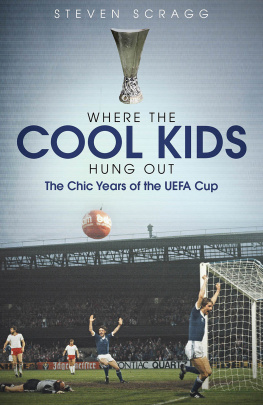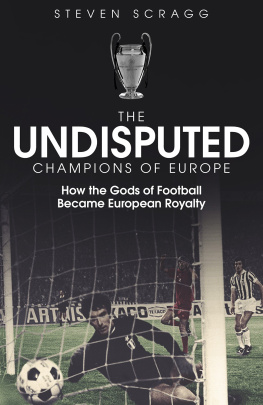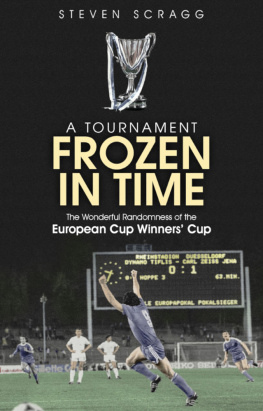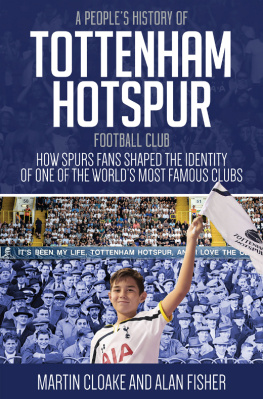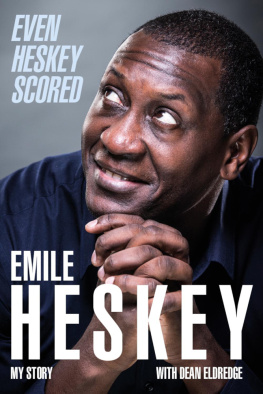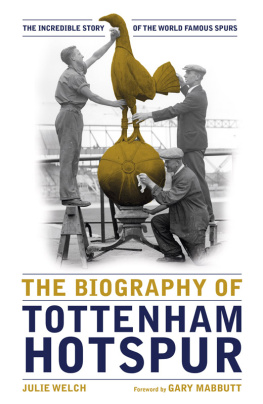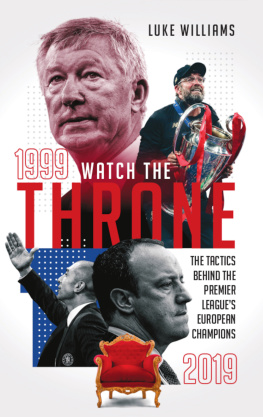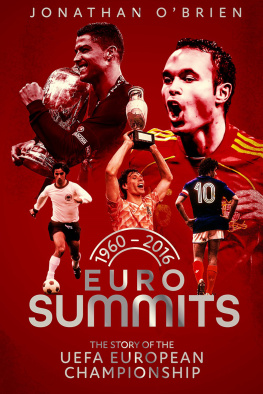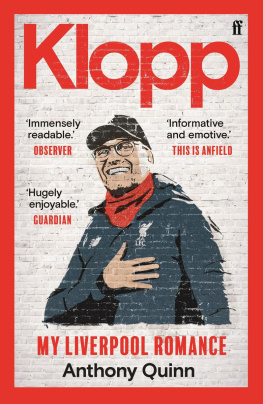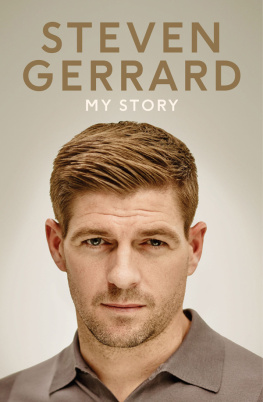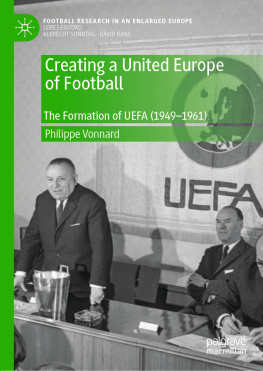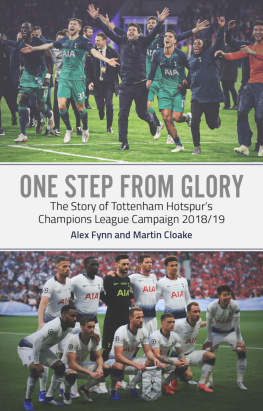Contents
Guide
First published by Pitch Publishing, 2020
Pitch Publishing
A2 Yeoman Gate
Yeoman Way
Durrington
BN13 3QZ
www.pitchpublishing.co.uk
Steven Scragg, 2020
Every effort has been made to trace the copyright.
Any oversight will be rectified in future editions at the earliest opportunity by the publisher.
All rights reserved under International and Pan-American Copyright Conventions. By payment of the required fees, you have been granted the non-exclusive, non-transferable right to access and read the text of this e-book on-screen. No part of this text may be reproduced, transmitted, downloaded, decompiled, reverse-engineered, or stored in or introduced into any information storage and retrieval system, in any form or by any means, whether electronic or mechanical, now known or hereinafter invented, without the express written permission of the Publisher.
A CIP catalogue record is available for this book from the British Library
Print ISBN 9781785316838
eBook ISBN 9781785318108
--
Ebook Conversion by www.eBookPartnership.com
Contents
Dedication
For my Uncle David, who we lost this year. You could go years without seeing him sometimes, but safe in the knowledge there was always a beer and a mad story or two to be offered by him when you did eventually catch up. I dont think I ever saw him when he wasnt laughing about something or other.
Acknowledgements
THIS IS my second book, both of which were conceived of a podcast. A couple of years ago, for These Football Times, we created a three-part podcast series about the glory days of the European Cup, the European Cup Winners Cup and the UEFA Cup, from where a throw-away, yet semi-serious remark, from my fellow senior writer, Will Sharp, resulted in the birth of the book A Tournament Frozen in Time.
As an example of how rising to a tongue-in-cheek challenge can sometimes get completely out of hand, A Tournament Frozen in Time ended up being shortlisted for the Football Book of the Year, by the Football Writers Association, while nods of agreement had already been made between myself and the wonderful Jane Camillin that we really should put together a sequel, all about the peak years of the UEFA (Yoofa) Cup essentially, the two-legged final era, which was largely played out before football was partitioned off from all but those that could either afford the extortionate price of a ticket, or a costly sports channel subscription.
Before long, the marvellously talented Duncan Olner had conjured up the front cover and just as with my first book, he translated the image I had in my minds eye perfectly. The two covers share a link. A goal has been scored in a final and it is being celebrated. The combined thrill and fear of seeing the cover to a book youve dreamt up is indescribable.
As was the case last time around, the encouragement of my These Football Times colleagues has been invaluable. Just like Will, with his initial suggestion that I needed to be writing a book, without the faith of Omar Saleem, the creator of These Football Times, this book would not exist. His long-standing belief in the words I write has been an inspiration that made the difference between me extending myself to write books, or not.
Furthermore, my fellow podcast partners, Stuart Horsfield, Gary Thacker and Aidan Williams have always been there with timely and rambling conversations about the subject matter, which have been crucial on those days when the words arent flowing as easily as Id have liked them to. Each have their own books in creation, and it has been a breath of fresh air to talk about those topics with them, too.
Chris Weir, Dan Williamson, Matt Evans, Andrew Flint and Jon Townsend have all cheered on from the sidelines too, often rounding people up on Twitter, to crowd round, when announcements about the book have been made, at times when some have their own books to worry about.
Hyder Jawd was once again a heroic figure, while Jeff Goulding, Karl Coppack and Trevor Downey have been the greatest unpaid social media publicists an author could wish for.
I have also drawn great strength from the continued support of my dad, my sister and brother, Alison and David, my unofficial soul sister, Hayley Coleman, plus the always enthusiastic backing of Andrew and Carrie Knott.
And then there has been my wife, Beverley. Counsellor, comforter, defuser of pandemic-related stresses and bringer of curry, she has always been everything, as have our children, Sam, Elsie and Florence, without whom this book would not have been.
Introduction
THE UEFA Cup, when compared to the European Cup and the European Cup Winners Cup, always felt like a thoroughly modern tournament. Futuristic even. Born in 1971, its archive footage of games is predominantly to be found in colour, apart from the odd exception here and there due to the vagaries of the staggered phasing out of black and white television across Europe.
If I were to be asked for a mental image of the European Cup in its early years, I would offer you the 1960 final between Real Madrid and Eintracht Frankfurt at Hampden Park (despite me not being born until 1974), while for the Cup Winners Cup I would give you the 1963 final, as contested by Tottenham Hotspur and Atltico Madrid.
Both these games flicker across the screen enigmatically, in a black and white monochrome manner. It is football, but not as a child of the 1970s and 80s would know it. While I embrace the black and white and pre-television era enthusiastically now, as a child it was an entirely different matter. I looked scornfully at archaic black and white footage of games, with its heavier ball, clumsy boots and cumbersome, billowing, cotton kits.
Sacrilege it might be, but Kenneth Wolstenholmes voice always sounded older than it was. When he commentated on the 1966 World Cup Final, he was only a few months older than I am now, but when his tone was attached to black and white images, he almost sounded 30 years older than he was.
Conversely, Wolstenholmes voice combined with colour footage jars, yet it shouldnt. David Coleman, the harder-edged BBC football voice of the 1970s, who had lived in Wolstenholmes shadow throughout the 1960s, was born less than six years beyond his former colleague, yet his voice suits colour footage better than it does black and white.
This is where the UEFA Cup was born, to an era of colour broadcasts and Airtex kits, of players not seeming like they could just as easily pass as RAF pilots, rather than the footballers they were. In this respect, Liverpool beating Borussia Mnchengladbach provides the images I most associate with the formative exchanges of the UEFA Cup, and they are images not delivered in a sepia-tinted black and white hue, but on a steamier and vibrant colour landscape.
Despite the dated hairstyles and the type of mutton chops Mungo Jerry would be proud to call his own, when I watch the goals of the 1973 UEFA Cup Final first leg, it feels like something I could reach out and touch, whereas the seven goals that Alfredo Di Stfano and Ferenc Pusks put past Eintracht Frankfurts Egon Loy in the 1960 European Cup Final seem as if they are broadcast from the surface of the moon, as opposed to the surface of Glasgows Hampden Park.

